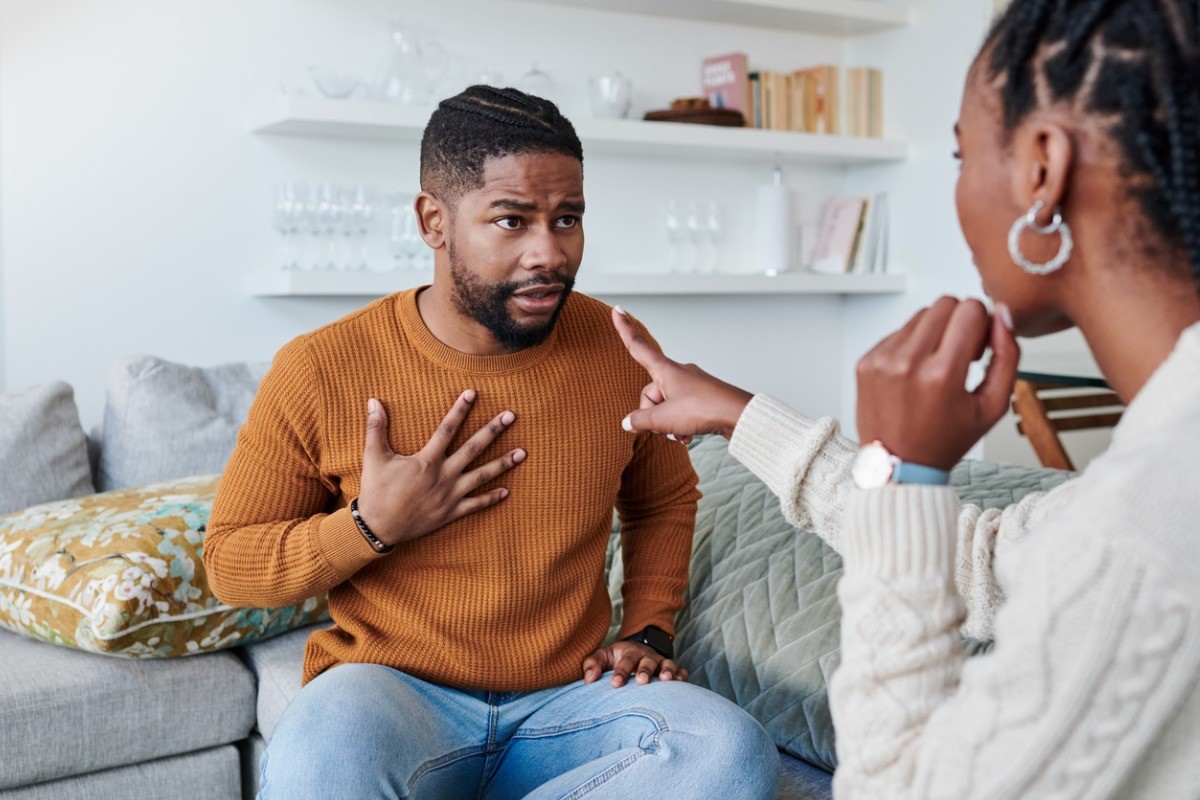10 Signs Your Relationship Is Headed for an “Emotional Divorce,” Therapists Say

Everyone knows what a divorce looks like: You sign the papers, split your assets, take off your rings, grieve (or celebrate), and do your best to move on and heal over the course of months or years. However, far fewer people realize that there’s another form of “divorce” that can be just as impactful yet harder to spot. Emotional divorce—the experience of becoming fully emotionally separated while still legally married to your partner—can leave both parties feeling isolated, unfulfilled, and completely disconnected. It can also ultimately lead to a more formal and final split.
RELATED: 6 Passive-Aggressive Comments That Mean Your Partner Wants to Break Up.
“When couples face emotional distance, the pain can feel as real as any legal separation,” says Rachel Marmor, LMHC, chief wellness officer at PAIRS Foundation. However, she says that just because you’ve entered a difficult season in the relationship doesn’t mean it’s necessarily time to call it quits.
“In my work, I have seen that when couples disconnect emotionally, it’s often not because they’ve stopped loving each other but because they’ve stopped expressing it in ways that nurture their bond. Recognizing these signs early gives a chance to heal,” she tells Best Life.
Wondering which red flags might mean you’re headed for emotional divorce? These are the 10 key signs to look out for, along with expert-approved tips to rekindle your connection.
1
Emotional intimacy is fading.

The first sign that your partnership is heading for emotional divorce is that your feelings of emotional intimacy or closeness have begun fading.
“You’ll know this when conversations become superficial—when you’re talking about logistics instead of feelings. If you no longer share your inner world—your joys, fears, and vulnerabilities—emotional distance grows,” says Marmor.
She recommends rebuilding emotional intimacy by “sharing your day in more than just facts.” This means creating a habit and a practice of setting aside time for meaningful conversation, “where you focus on listening to understand, not to fix,” Marmor says.
Licensed psychotherapist and author Suzette Bray, LMFT, agrees that taking this approach can help bring the relationship back from the brink. “Emotional intimacy thrives on vulnerability, so making space for deeper conversations is a good idea,” she tells Best Life.
2
You’re no longer on the same team.

If criticism and defensiveness have become a hallmark of your communication, this may mean you’re careening toward emotional divorce. Bray says this can often take the form of sarcasm, eye-rolling, name-calling, dismissiveness, or contempt.
“When we criticize, we’re often expressing frustration without really understanding where the pain is coming from. Defensiveness is a natural reaction, but it keeps us from hearing each other,” says Marmor.
If you notice that you no longer feel like you’re on the same team, she recommends breaking the cycle by saying something like: “I feel like we’ve been attacking each other more than usual. Can we slow down and talk about what’s really bothering us without placing blame?”
3
You avoid conflict.

Conversely, avoiding conflict may be another sign that’s just as telling as outright conflict or contempt.
“Avoiding conflict may seem like peace, but it leads to a buildup of unspoken frustrations. Over time, silence becomes distance. When you avoid hard conversations, you lose the chance to understand each other’s needs,” says Marmor, adding that conflict is not necessarily the enemy—disconnection is.
In other words, asking “Why bother?” should be considered a wake-up call—one that you can answer by carving out time “in which you both agree to speak calmly and listen deeply,” Marmor suggests.
“Sometimes, the goal isn’t to solve the problem immediately but to acknowledge that it exists,” the counselor notes.
RELATED: 7 Things Divorced People Wish They Had Done Differently in Their Marriage.
4
There’s less physical touch.

Your sex life slowing down doesn’t necessarily mean that your relationship is on the rocks, but it can sometimes signal a lack of connection, the experts say.
“Physical touch is a language of love. When touch fades, even in small ways like holding hands or hugging, it’s often a sign that emotional closeness has slipped away too,” Marmor tells Best Life.
Bray adds that if physical touch has become awkward, rare, or robotic, you can help things along by reintroducing small moments of physical affection. “Start with casual, low-pressure touches like holding hands, a brief shoulder rub, or sitting close during movie night. Build from there,” she advises.
5
You’re living parallel lives.

Not every aspect of your life needs to involve your spouse, but if you feel that you’ve started to live parallel lives without feeling genuinely connected, this can sink your relationship in slow motion.
“When couples begin living side by side, but not together, they’ve shifted into a roommate dynamic,” Marmor says. “You stop sharing your day or your dreams, and it feels like you’re just managing life rather than experiencing it together.”
She suggests planning intentional moments of connection, such as going on a weekly date night or developing a shared hobby. “It’s about bringing joy and shared experiences back into the relationship,” she says.
6
You’ve lost curiosity about each other.

Relationship experts all agree: You should continue to date your partner long after you’re married. This means assuming that you haven’t learned everything there is to know about them, and seeking out new ways of seeing them and connecting with them.
“When you stop being curious about each other—about how your partner feels, what they think, or what’s going on in their world—you risk losing that essential bond,” says Marmor. “Curiosity is what keeps love alive; it’s the spark that shows, ‘I see you, I care.'”
She recommends asking open ended questions or saying: “I realize I haven’t been asking about how you’re doing lately. I’d love to hear what’s been on your mind.”
7
You feel lonely despite being together.

Everyone feels lonely from time to time—you won’t be the only exception just because you’re coupled up.
However, persistent feelings of loneliness in a relationship often stems from a lack of emotional connection, Marmor says. “Even when you’re physically together, you might feel unseen or unheard, leading to feelings of isolation.”
She says it’s a good idea to acknowledge the feeling of loneliness to your partner, without placing blame. You might say: “I’ve been feeling a bit lonely even when we’re together, and I wonder if you feel that way too. How can we find ways to connect more deeply?”
RELATED: 8 “Small But Toxic” Things to Stop Saying to Your Partner, According to Therapists.
8
You often look outside of the relationship for emotional support.

Your partner can’t be your sole support system—it truly takes a village. Yet if you notice that you look outside of your relationship for emotional support because you lack that support at home, this could be a sign that you’re headed for an emotional divorce.
“If one or both partners begin turning to friends or even new connections for emotional support, it’s a sign that the emotional intimacy in the relationship has broken down,” says Marmor. She adds that this can be particularly troubling since it can result in harmful emotional affairs—or even physical affairs—when one partner feels neglected or misunderstood.
To reorient things back toward your partnership, it’s a good idea to name the problem, she says. Try saying: “I’ve noticed I’ve been leaning on others for emotional support lately, and I want to talk about why that’s happening between us.”
9
Old wounds feel fresh.

Bray says that if old wounds keep bubbling up—an affair, a broken promise, or some other betrayal that you just can’t seem to let it go—this most likely means that your relationship is in need of some deep healing in order to move forward.
“If you can’t resolve past issues on your own, it may be time for professional help. Sometimes you need an outside perspective to unpack what went wrong and figure out how to truly forgive or move forward,” she says.
10
You no longer share goals or excitement for the future.

Finally, if your future feels uncertain, and no longer feels like a source of excitement or connection, this could be another red flag that your connection has been severed.
“When a couple no longer talks about or works toward shared goals—whether it’s as simple as planning a vacation or as big as buying a house—they may start to feel disconnected,” says Marmor. “Reignite the excitement for the future by setting goals as a couple. Talk about what you want to achieve together and how you can support each other’s dreams.”
She adds that the same tools that will help to repair this particular problem can also help to repair the relationship more generally.
“By engaging in these conversations and recognizing the signs of emotional disconnection, couples have the opportunity to heal, reconnect, and grow together,” Marmor says. The key to reversing an emotional divorce is consistent communication, empathy, and shared experiences. When couples truly see each other, they can restore the connection that may have been lost.”